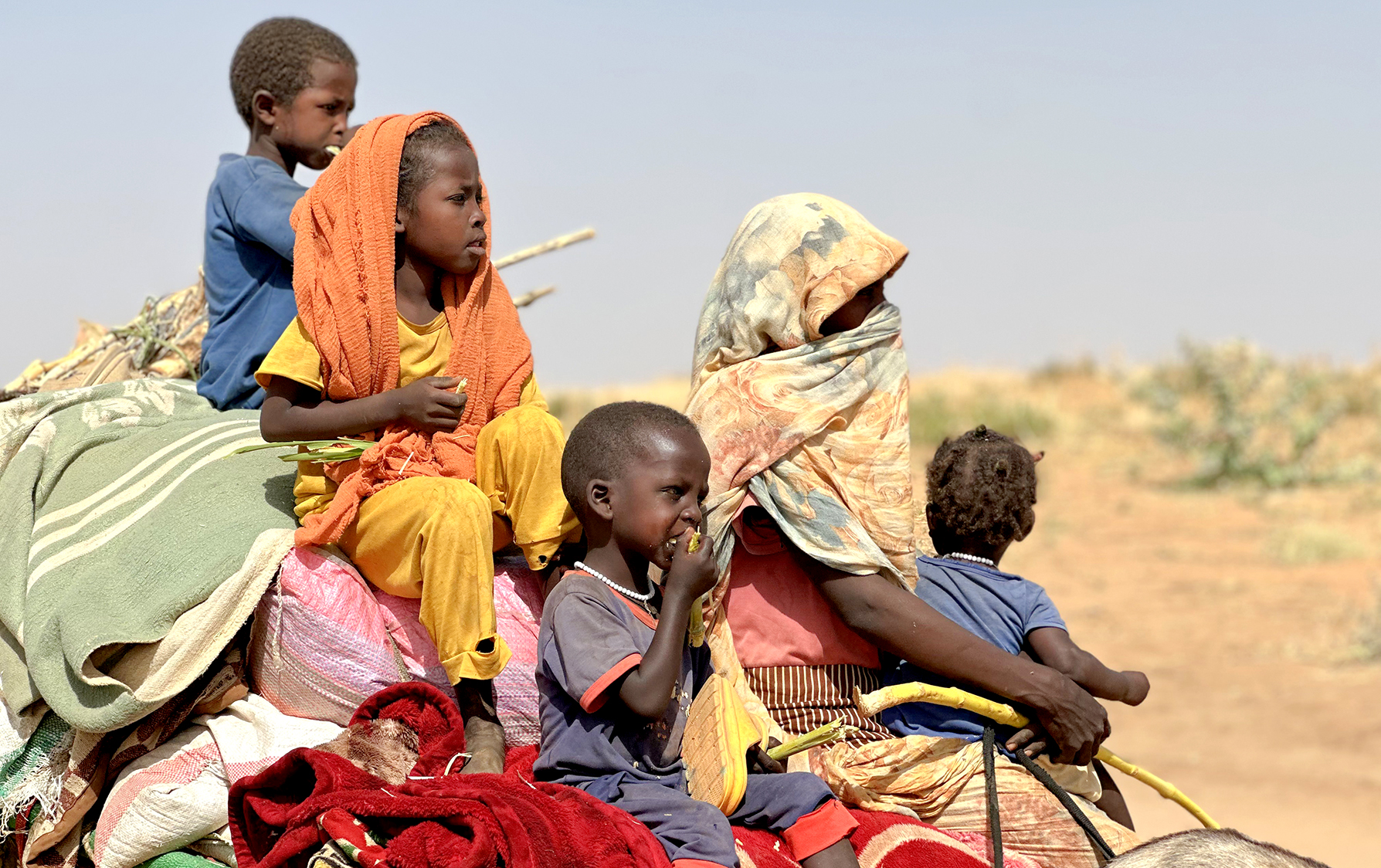The United Nations (UN) Security Council on Thursday, 30 October 2025, condemned the atrocities being perpetrated by the paramilitary Rapid Support Forces (RSF) in El Fasher, the capital of North Darfur, which include “summary executions and arbitrary detentions”.
The UK, as the penholder on Sudan, called an emergency meeting of the UN Security Council in New York on Thursday after the RSF seized El Fasher on Sunday after an 18-month siege on the region.
The RSF has killed at least 1,500 people in El Fasher since its fall on Sunday, according to a report from Al Jazeera, including more than 460 patients at a Saudi Hospital on Tuesday.
“On 26 October, Saudi Maternity Hospital, the only partially functioning hospital in El Fasher, was attacked for the fourth time in a month, killing one nurse and injuring three other health workers. On 28 October, six health workers, four doctors, a nurse and a pharmacist, were abducted. On the same day, more than 460 patients and their companions were reportedly shot and killed in the hospital,” the World Health Organization (WHO) said in a statement on Wednesday.
Two years of fighting between the RSF and the Sudanese Armed Forces (SAF) in Sudan has killed more than 40,000 people, a figure human rights organisations consider a significant undercount, and has created the world’s worst humanitarian crisis, reported the Associated Press.
More than 14.5 million people have been displaced in the region, and about 25 million people are in dire need of humanitarian assistance.
Read more: Beyond the lens: The normalisation of horror in Sudanese war imagery
The UN Human Rights Office on Monday said that it had received “multiple, alarming reports” that the RSF was executing civilians trying to flee El Fasher, “with indications of ethnic motivations for killings”.
“The situation is simply horrifying,” Martha Ama Akyaa Pobee, the Assistant Secretary-General of the UN for Africa, told the Security Council on Thursday.
“In the past week, the UN Human Rights Office has documented widespread and serious human rights violations in and around El Fasher. These include credible reports of mass killings in various locations and summary executions during house-to-house searches and as civilians tried to flee the city.
/file/dailymaverick/wp-content/uploads/2025/10/13278693-1-1.jpg)
“Communications have been cut off. The situation is chaotic. In this context, it is difficult to estimate the number of civilians killed. Despite commitments to protect civilians, the reality is that no one is safe in El Fasher. There is no safe passage for civilians to leave the city,” said Pobee.
The WHO estimates that more than 260,000 people remain trapped in El Fasher with almost no access to food, clean water or medical care.
“What began as a siege over 500 days ago has become a massacre,” Slovenian Ambassador to the UN, Samuel Žbogar, told the Security Council.
“Once a fragile haven for hundreds of thousands, El Fasher is now the epicentre of Sudan’s agony. A city starved, silenced and brutally assaulted, facing famine-like conditions, a collapsed health system and no safe way out.”
‘A crisis of apathy’
A report by the Humanitarian Research Lab (HRL) at the Yale School of Public Health, published on Monday, 27 October, found satellite images that provided evidence of suspected mass killings by RSF forces as El Fasher fell. The images collected by the HRL appeared to show clusters of objects “consistent with the size of human bodies and reddish ground discolouration” around El Fasher.
“I urge colleagues, if you haven’t already, to study the latest satellite imagery of El Fasher. Blood on the sand,” Tom Fletcher, the UN relief chief, told the Security Council.
“Mr President, I urge colleagues to study the world’s continued failure to stop this. Blood on the hands.”
🚨HUMAN SECURITY EMERGENCY🚨
El-Fasher has fallen to RSF. HRL finds evidence of mass killings including door-to-door clearance operations and objects consistent with reported bodies on berm entrapping El-Fasher.#KeepEyesOnSudan🛰️@AirbusSpace @Maxarhttps://t.co/1HApllgNL5 pic.twitter.com/yrCbM5HxeP
— Humanitarian Research Lab (HRL) at YSPH (@HRL_YaleSPH) October 27, 2025
He said the crisis in Sudan “is also a crisis of apathy”.
“What is unfolding in El Fasher recalls the horrors that Darfur was subjected to 20 years ago. But somehow today we are seeing a very different global reaction — one of resignation… My simple question to the Council — and to all of us working on this broken effort — is this: What is it about this crisis that makes it so hard?” Fletcher asked.
Read more: Large volumes of international arms are fuelling Sudan’s civil war, says Amnesty International
Fletcher, along with several other diplomats, called for the cessation of weapons and support to paramilitary forces in Sudan, but declined to say who provides them.
“This war is not self-sustaining. It is fuelled from beyond Sudan’s borders by the continuous flow of weapons, resources and support. We urge — no, we demand — from all states of this organisation to refrain from any action that prolongs the violence and to uphold this council’s arms embargo,” said Žbogar.
However, Sudanese Ambassador to the UN, Al-Harith Idriss al-Harith Mohamed, told the Security Council: “There is no civil war in Sudan. It is a war of aggression launched by the United Arab Emirates (UAE), through its regional proxy the Rapid Support Forces, and it cannot be described as a two-party war.”
/file/dailymaverick/wp-content/uploads/2025/08/019A8278.jpg)
The UAE has been widely accused of covertly supplying weapons to the RSF via neighbouring Chad, an allegation it has consistently denied, reported The Guardian. In March this year, Sudan brought a case against the UAE at the International Court of Justice, accusing the UAE of “complicity in genocide”. The court dismissed the case in May, saying it “manifestly lacked” the authority to continue the proceedings.
Responding to Mohamed’s remarks, the UAE Ambassador to the UN, Mohamed Abushahab, said that “it is an absurdity that one of the warring parties can carry on politicising this forum by disseminating false and baseless allegations”.
‘Adhere to international law’
South Africa’s Department of International Relations and Cooperation, in a statement on 30 October, condemned the “abhorrent attacks deliberately targeting civilians and essential civilian infrastructure” in Al Fasher, but stopped short of saying who perpetrated them.
“We firmly assert that there must be no impunity for the serious violations of international humanitarian law (IHL) and international human rights law (IHRL). The principle of protection of civilians and the safeguarding of essential infrastructure remain non-negotiable legal and moral obligations,” said Department of International Relations and Cooperation Minister Ronald Lamola’s spokesperson Chrispin Phiri.
The Government of the Republic of South Africa welcomes the emergency meeting convened by the African Union Peace and Security Council (AU PSC) concerning the gravely worsening situation in the Republic of Sudan. The decisive intervention of the African Union at this critical…
— Chrispin Phiri 🇿🇦 (@Chrispin_JPhiri) October 30, 2025
Phiri said SA welcomed the emergency meeting convened by the African Union (AU) Peace and Security Council “concerning the gravely worsening situation” in Sudan. The AU in a statement on Monday, said it was deeply concerned “over the escalating violence and reported atrocities in El Fasher, following its takeover by the Rapid Support Forces (RSF)”.
SA called upon the SAF and the RSF to immediately and unconditionally:
- Implement an immediate and verifiable cessation of hostilities.
- Adhere strictly to their obligations under IHL and IHRL, including protecting medical personnel and allowing safe passage for those seeking refuge.
- Ensure rapid, safe and unhindered humanitarian access to all affected populations across Sudan.
Phiri added: “We call upon all external actors and countries involved in this crisis to adhere to international law. This entails moving away from any form of supporting, supplying or enabling the armed belligerents.”
A recent report from the Southern Africa Litigation Centre accuses the South African government of breaking its own laws and violating its commitments to “silencing the guns” by selling arms to military juntas or states that are committing human rights abuses.
Read more: SA accused of hypocrisy for exporting arms to military juntas and violators of human rights
SA is selling arms to the African countries of Mali, Guinea, Gabon and Burkina Faso — all which are controlled by military governments that seized power in coups — and to Saudi Arabia and the UAE, which have been accused by the United Nations of human rights abuses, according to the Southern Africa Litigation Centre report. DM





 Sudanese people, who fled from the internally displaced persons Zamzam camp, on their way to the Tawila Camps amid the ongoing conflict between Sudan’s army and the Rapid Support Forces in North Darfur, Sudan, on 14 April 2025. (Photo: EPA / Marwan Mohamed)
Sudanese people, who fled from the internally displaced persons Zamzam camp, on their way to the Tawila Camps amid the ongoing conflict between Sudan’s army and the Rapid Support Forces in North Darfur, Sudan, on 14 April 2025. (Photo: EPA / Marwan Mohamed)